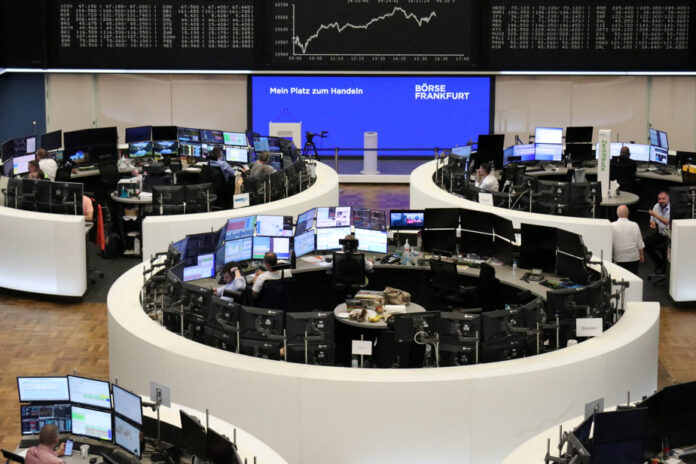(Paris) European stock markets rebounded on Wednesday and Wall Street should do the same the day after a sluggish session, while Asian stock markets were affected by the entry into deflation in China.
Stock market Europe seems to want to erase Tuesday’s session, weighed down by disappointing economic data in China and sharp declines in the banking sector. Paris (0.96%) and London (0.70%) even made up for the losses of the previous day. Frankfurt rose for its part by 0.82% and Milan by 1.50%, around 8:25 a.m. (Eastern time).
The banks, which had particularly toasted on Tuesday, clearly resumed their colors on Wednesday, after the decision of the government of Giorgia Meloni to put a ceiling on the tax on their “surplus profits”, announced the day before.
In Milan, Unicredit was up 4.39%, BPER 3.55%, Banco BPM 4.47%, Monte dei Paschi di Siena 3.12% and Intesa Sanpaolo 3.06% around 8:20 am ET .
Elsewhere in Europe, banks are also rebounding: BNP Paribas rose by 1.77% in Paris, Commerzbank by 0.94% in Frankfurt and Banco Sabadell by 1.73% in Madrid.
The quiet news in August is generally conducive to technical movements in financial markets, the variations of which are exacerbated by reduced trading volumes.
The New York Stock Exchange, which ended slightly lower on Tuesday, is heading for an open gain of around 0.2% according to futures for the three major indices, ready to erase the previous day’s session to return to a wait-and-see position, before the publication of US inflation on Thursday.
In Asia, on the other hand, Tokyo lost 0.53%, Shanghai 0.49% and Hong Kong ended a small increase of 0.32%, after the announcement of a drop in the consumer price index. in China, the main gauge of inflation, at -0.3% YoY in July.
The country is thus entering deflation for the first time since 2021, bad news for the economy, because it means that consumers, instead of spending, are likely to postpone their purchases in the hope of more price cuts.
As for the producer price index, it contracted again in July (-4.4%) for the tenth consecutive month.
“These numbers will amplify concerns about China’s economic growth potential,” said Stephen Innes of SPI Asset Management.
The world number one in tourism TUI (-2.75% in London) said on Wednesday it was on track to achieve a “very good” summer season. Between April and June, the German group posted adjusted operating profit, the first for this period since the pandemic.
Investors, however, are concerned about the impact of heat waves and fires. Regarding the Greek island of Rhodes, hit by fires in July, the costs related to cancellations and unsold trips, compensation and repatriation flights are estimated by the group at around 25 million euros.
The Belgian-Dutch distribution giant Ahold Delhaize reported on Wednesday a net profit down 22.5% in the second quarter, notably affected by inflation, climate impacts and social actions. Its title lost 1.10% in Amsterdam.
Around 8:20 a.m. (Eastern time), the Dutch TTF futures contract, considered the benchmark for European gas, soared by almost 22%, evolving to 37.79 euros per megawatt hour, after having reached a high since early July.
Oil prices rallied around 8:20 a.m. EST, benefiting from the weakness of the dollar and the return of investors’ risk appetite, amid limited supply from OPEC .
A barrel of Brent from the North Sea, for delivery in October, took 0.78% to 86.84 dollars and its American equivalent, a barrel of West Texas Intermediate (WTI), for delivery in September, 0.84% to $83.62.
On the foreign exchange market, the euro gained 0.10%, to 1.0967 dollars for one euro.
Bitcoin fell 0.41% to $29,860.















